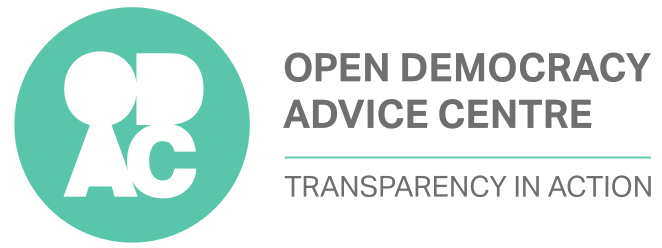The Information Regulator on #IDUAI2016
- By Gabriella Razzano
Today, 28 September, we celebrate worldwide the International Day for Universal Access to Information (#IDUAI2016). The Day was adopted after intense lobbying by ODAC and the rest of the African Platform on Access to Information Working Group. The Day is vital for spreading the word about the importance of access to information, and in South Africa provides a vital opportunity for a rallying call on the new role of the Information Regulator.
Very recently, the National Parliament recommended Adv. Pansy Tlakula for the role. This was not met with uniform support by all circles but – in acknowledgment of the importance of ATI that today highlights – ODAC feels it is vital to consider why the role is so important, and so urgently needed. The Regulator will have jurisdiction and enforcement powers over both the Promotion of Access to Information Act (PAIA) and the Protection of Personal Information Act (POPI), and will serve as an important mechanism for protection of privacy rights as well as access to information rights. But why does this matter?
The right to access information expressed in section 32 of the Constitution has been given effect to through PAIA. Yet, as the primary instrument for promoting access to information and a fuller realisation of all rights, there are issues in implementation of the PAIA that ODAC has consistently been witness to over the years.
Through our own research, and research done in partnership with other groups, we have discovered that:
- Awareness of the Promotion of Access to Information Act is associated to social and educational status;[1]
- In turn, there is indication that ‘legalistic’ requests that are submitted are more likely to be responded to that ‘normal’ ones, which does not bode well for the average user of the Act;[2]
- A comparison between the statistics of a student requester compared to the statistics of a coalition of non-governmental organisations that work on PAIA demonstrate that a novice requester will receive far more refusals (86% refused versus 56.5% refused);[3]
- Regardless of the type of requester, it is clear that non-responses or refusals to access remain significantly high; yet
- Litigating on PAIA is made difficult due to significant costs and delays, and remains largely within the purview of non-governmental organisations as a method of recourse.[4]
It is within this problematic human rights context that the Protection of Personal Information Act 2015 created an Information Regulator as a form of ombudsman mechanism, which will try and provide fast, efficient and considered recourse for all South Africans. The need for the Office is patently urgent. ODAC calls on all involved, to mark the special occasion of #IDUAI2016, to do everything we can to make sure the formal establishment of this Regulator is made a priority.
[1] Razzano, G (2015) Accessing Information? What we Know from User Experiences, available at https://opendemocracy.org.za/index.php/what-we-do/access-to-information/odac-paia-users, p 5.
[2] Van Der Mey, S & Eyal, K (2014) The Impact of Emotional ‘Affect’ on Municipal Budget Transparency in South Africa: A randomized control trial using PAIA requests, accessed 15 March 2015, available at https://open.uct.ac.za/bitstream/item/10148/Stephanie%20van%20der%20Mey%20Transparency%20in%20Municipal%20Budgets%20PAIA%20Final%20Version.pdf?sequence=1.
[3] Ibid.
[4] PAIA Civil Society Network (2015) PAIA Civil Society Network Shadow Report 2014 (South Africa: SAHA), p.13. This was vitally confirmed by Kader Asmal, who noted that benefits of PAIA fell beyond the reach of the majority of South Africans because of the absence of a free and easily accessible mechanism for redress on access to information disputes. See Ad Hoc Committee on the Review of Chapter 9 Institutions (2007) Report of the Ad Hoc Committee on the Review of Chapter 9 Institutions: A report to the National Assembly of Parliament (Parliament: South Africa), available at http://www.sahrc.org.za/home/21/files/Reports/Report%20of%20the%20Ad%20Hoc%20Committee%20of%20chapter%209.%202007.pdf.
